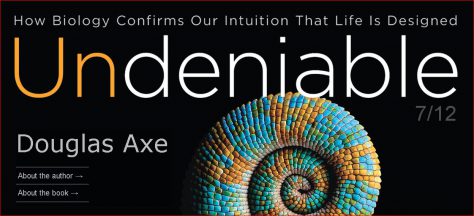
The host of the Cross Examined radio show Dr. Frank Turek talks with Stephen C. Meyer and Doug Axe about a recent conference of Royal Society scientists discussing the problems with the theory of macro-evolution.
Summary:
- about the Royal Society conference
- the main topic was whether naturalistic mechanisms can produce new body plans and new organ types
- no one disputes micro-evolution: beaks changing size, antibiotic resistance
- many of the naturalistic scientists admitted the problems with current naturalistic theories, but they don’t want to embrace the need for a designer
- none of the proposals that were debated solved the real problems with macro-evolution
- Problem #1: the sudden origin of body plans in the fossil record
- Problem #2: the origin of information (e.g. – in protein molecule)
- Problem #3: need for favorable early mutations (for body plans)
- Problem #4: the problem of epigenetics
- Problem #5: the universality of the design intuition
Some of these problems have actually gotten worse for naturalistic evolution as our scientific knowledge has grown.
If you want the two best books on intelligent design, get Dr. Meyer’s “Signature in the Cell” and “Darwin’s Doubt”. I should note that Dr. Meyer is not a young Earth creationist, and has defended the Big Bang cosmology as a solid evidence for a Creator of the universe. Being in favor of an old universe and an old Earth is compatible with being opposed to evolution – because of scientific reasons.

Good stuff. I think you have “macro” when you mean “micro” in one of your summary points.
LikeLiked by 1 person
Oh my goodness. I fixed it. THanks!
LikeLiked by 1 person
Stephen Meyers book “Darwins Doubt” was a real eye opener on presenting really sound, empirical arguments for the failure of naturalism in accounting for the diversity of life. Particularly his work on the rarity of proteins in protein sequence space.
LikeLiked by 1 person